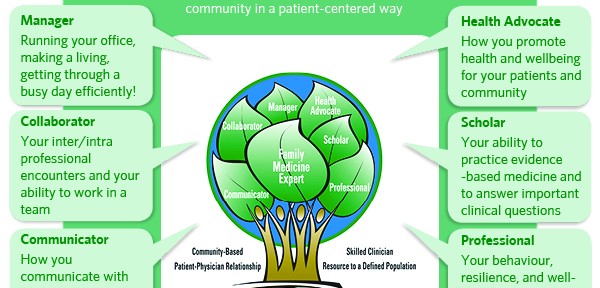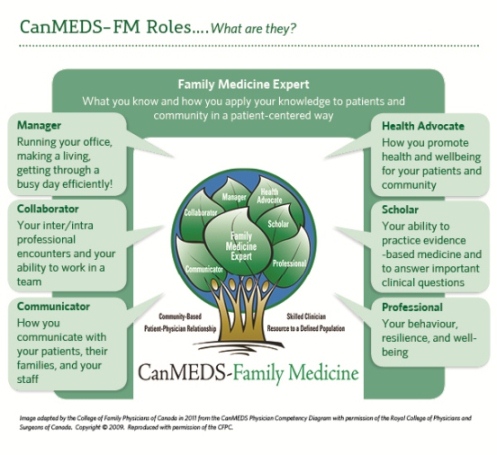by Dr. Willa Henry, UBC Family Practice Residency Program Director
We have a new curriculum!
The CFPC (“the College”) has introduced the Triple C Competency-based Curriculum.
The “C”s stand for:
Continuity – Residents have ongoing contact with a group of patients and ongoing contact with preceptors
Context of Family Medicine – More rotations take place in settings more suitable for family medicine skills
Comprehensive – Residents acquire skills in all domains of care and in multiple practice settings (office, ER, Hospital, OB)
Competency – Residents are given clear outcomes, which preceptors observe to determine competence
(Yes… the Triple C actually has 4 Cs!)
Triple C and CanMEDS-FM
The Triple C is framed within the CanMEDS-Family Medicine (FM) Roles.
These are the seven roles that define the competencies which patients have identified as important for successful clinical practice.
(Download a print version of the above image.)
CanMEDS-Family Medicine (CanMEDS-FM) is a competency framework for family medicine education. It is adapted from the Can-MEDS framework developed by the Royal College.
Its purpose is to guide curriculum and form the basis for the design and accreditation of family medicine residency programs. Its ultimate goal is to improve patient care and to ensure that postgraduate training programs in family medicine are responsive to societal needs.
Our curriculum objectives and assessment forms will be transitioning to this framework over the next two years. As a preceptor, it is important for you to be aware of this new initiative. Future faculty development communications will focus on teaching and assessing each of the CanMEDS roles.
Take a look at your agenda for a recent busy day. Can you identify these roles in your day to day life?
If you can, you can start to teach and assess these roles in your learners!
What can you do to guide your resident under the new curriculum?
Focus on specific competencies. Ask your resident which competencies he or she is working to develop on a day to day basis. Provide opportunities for your resident to practice skills associated with each competency, then observe and record progress. The use of field notes will help expedite this process!
Ask your residents what other rotations or clinics they have been attending and invite them to “teach” you some of their newly learned clinical pearls… Then help them apply these new skills within your practice.
Periodically review the variety of cases your resident is managing. Try to provide more opportunities within areas of competence where a resident has specific learning objectives or obvious weaknesses.
“Preceptors reach impressions about learners not from objective measurement of knowledge or skills, but rather from repeated observation of how they address the problems and needs of patients and team members.” Canadian Family Physician 2009; 55(12): 1260-1262
Resources
On the Triple C . CFPC.
Advancing Canada’s family medicine curriculum: Triple C. Canadian Family Physician 2011; 57.
Renewing postgraduate family medicine education: the rationale for Triple C. Canadian Family Physician 2011; 57(8): 963-964.
Comprehensive care and education. Canadian Family Physician 2011; 57(12):1457-1476.
Redesigning Family Medicine Residency in Canada: The Triple C Curriculum. Family Medicine 2012;44(2):90-7.
CanMEDS-Family Medicine Roles, in CanMEDS-Family Medicine Working Group on Curriculum Review. CFPC. October 2009: 5-22.
We’d love to hear from you! Please fill out our 1-minute survey by March 23, 2012 for a chance to have your name drawn for a $25 Chapters gift card.
Graphic by Lindsay Gowland.


One reply on “Introducing the Triple C Competency Curriculum”
Great post! Thanks for this information.